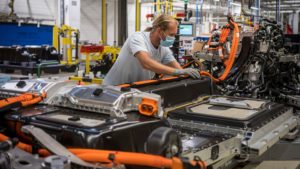Volvo Cars is tripling electric car manufacturing capacity at its plant in Ghent, Belgium, to meet growing demand for its Recharge line-up of EVs.
According to the manufacturer, by 2022, electric car capacity there will make up about 60% of the factory’s total production capacity.

Ghent already builds the XC40 Recharge, the company’s first fully electric car, as well as plug-in hybrid versions of the XC40.
The plant will also take a second fully electric model into production later this year, based on Volvo’s Compact Modular Architecture (CMA).
While Ghent is the first of its global manufacturing network to build fully electric cars, the company also plans to increase electric car manufacturing capacity at its other facilities around the world.
Last month, Volvo Cars announced it will assemble electric motors at its powertrain plant in Skövde, Sweden and invest 700m Swedish Krona (£63m) to establish complete in-house e-motor production at the site by the middle of the decade.
Volvo Cars is also investing significantly in the in-house design and development of e-motors for the next generation of EVs.
The firm said in 2020 the share of its Recharge electric cars as a percentage of total sales more than doubled compared with 2019.
By 2025, it wants 50% of its global sales be fully electric cars, with the rest hybrids.
Javier Varela, Head of Global Industrial Operations and Quality at Volvo Cars said: “Our future is electric and customers clearly like what they see from our Recharge cars.
“As we continue to electrify our line-up and boost our electric production capacity, Ghent is a real trailblazer for our global manufacturing network.”



